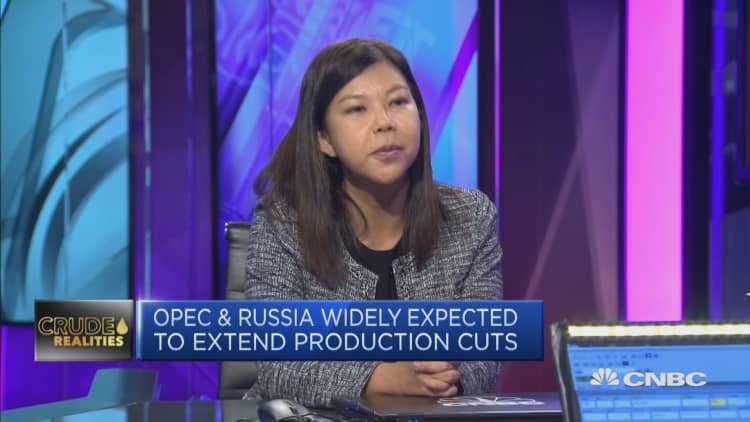Oil prices dropped on Friday, cutting into a winning month for crude.
West Texas Intermediate futures fell more than 4% to settle at $55.17, posting a 4.1% loss for the week and snapping a 3-week winning streak. Trading volume was lighter than usual Friday, and crude did still manage to finish the month with a 2.3% gain. European Brent futures fell $1.44 to settle at $62.43. For the month prices were up 6%, making it the best month since April.
Traders chalked the decline up to the resignation announcement of Iraq's prime minister after weeks of deadly protests, as well as investors jockeying for position before the OPEC+ meeting next week.
Following weeks of unrest in Iraq, Prime Minister Adel Abdul-Mahdi announced plans to resign Friday. Some traders believe an end to the country's ongoing protests will lead to an end of threats to oil disruption, which is bearish for prices.
But RBC's Helima Croft said tensions in the country may not be over so soon.

"I think oil drops because market participants believe that the protests are over but I am [not] so sure that this will assuage the demonstrators who have called for a complete overhaul of the entire political system and the patronage machine," she said.
"Also is Iran going to be so happy to lose its key foothold in the country? I think the battle for the future of Iraq could be heating up," she added.
OPEC is also in focus as the organization and its allies get ready to meet next week in Vienna. They were previously expected to announce an extension of the current output cut of 1.2 million barrels per day. This comes as output in the United States production continues to hover around record high levels.
But Again Capital's John Kilduff said that hopes of a bullish outcome from the meeting are fading. NationShares president and chief investment officer Scott Nations echoed this, saying that the meeting has been thrown into turmoil following comments from Russian Energy Minister Alexander Novak.
"Russia's energy minister signaled that Russia is likely to request a change to the current agreement among OPEC+ to curb output in an effort to boost crude oil prices. Expectations were for the production cuts to extend until Autumn of 2020 after an expected extension in March or April of next year and it now seems very likely they will end in March. This throws next week's OPEC+ meeting into turmoil," he said to CNBC.
Saudi Arabia is another key player to watch, Tudor, Pickering, Holt & Co. managing director Michael Bradley said. He noted that the meeting might now be "more controversial than expected" since the country is sending signals that it's "no longer kosher" for countries to exceed their production quotas. Next week's meeting is the first for Prince Abdulaziz bin Salman who became the country's oil minister in September, so Bradley said that he's also likely trying to throw his weight around prior to the meeting.
That said, he noted that volatility typically takes place ahead of OPEC meetings, and that the price action will likely continue right up to the final day of meetings.
-- CNBC's Patti Domm and Reuters contributed to this report.


